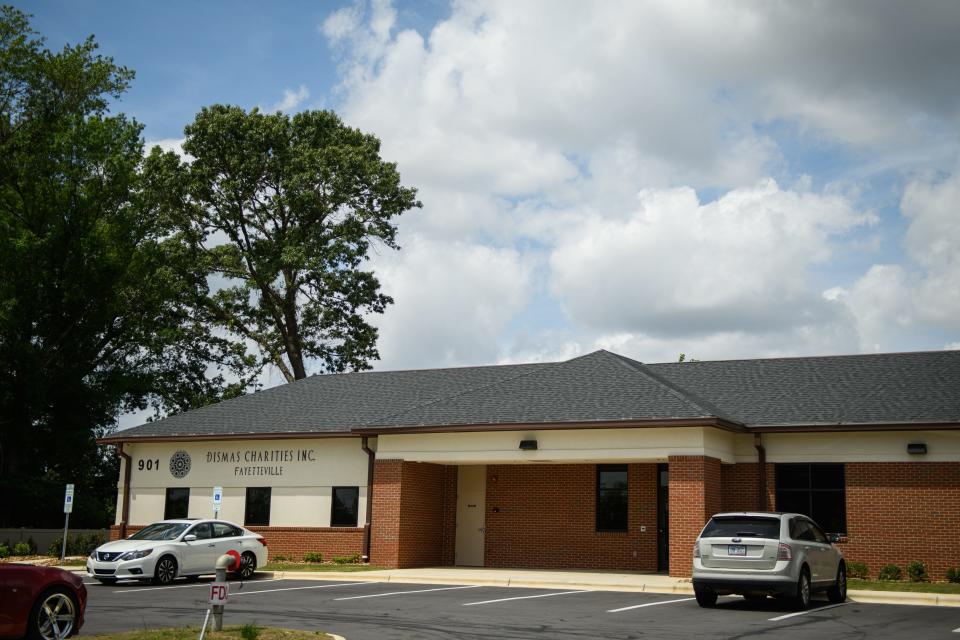Fayetteville halfway house — inside, three sex offenders. Outside, few complaints reported
Rafael Rivera years ago led a legal fight to stop a halfway house from locating on Cain Road off Bragg Boulevard.
He says now — with some degree of totally unwarranted guilt — that he had to “wave the flag.” He believes money won in the end.
Dismas Charities, a place for federal inmates who are transitioning back to regular life, with access to job placement and counseling, opened in the summer of 2023.
Rivera lives a mile away and says he only took up the fight against Dismas for older neighbors who lived closer.

He still keeps an eye out.
“If I lived there, I would be concerned about the sexual predators that live in there,” he tells me. He had looked at the publicly available NC Sex Offender Registry and found offenders with the same address as Dismas.
I looked, too. There are three — one of whom victimized a 4-year-old, another whose victim was 13.
More: As inmate halfway house is built next to homes, Fayetteville OKs ordinance to stop others
I don’t want to minimize or overblow this development. If you do an offender search in most any neighborhood, names will pop up — some worryingly close. These offenders are not under supervision as Dismas inmates would be, either. The lesson is that it is a good idea to check the registry, periodically, wherever you live.
I reached out to Dismas and was bounced along a phone tree from Fayetteville to its Louisville, Kentucky, headquarters to its Charlotte site. A spokeswoman said she would get back to me on questions I emailed Tuesday; I have not heard back so far.
Moving beyond 'Hate it'
Keeping an eye out is the order of the day for people who once vigorously opposed the location of Dismas Charities. It is a Kentucky-based organization that also has facilities in Charlotte and Greensboro. It took two City Council votes and appellate-level litigation for the project to go forward.
Dismas is in Councilman D.J. Haire’s district. He voted against it twice and once summed up his opinions of the location, which is behind one residential community and next to another one: “Hate it. Hate it. Hate it.”
More: Dismas Charities will move forward with controversial halfway house in Fayetteville
But today he says he has not heard any negative comments about the impact of the facility on the surrounding neighborhood. Meanwhile, the regular flow of concerns he hears from nearby neighbors continues on as usual — issues like speeding and other neighbors’ unkempt lawns.
Haire meanwhile says he drives by Dismas often. Last month he went inside; he did not advertise he was on City Council, he said. He said he just wanted to check it out, having never been in before.
“I have no issues with the building,” he said. “I think it’s a nice structure as far as that goes. I just wanted to sit there and kind of look and see what I heard without asking too many questions and bringing too much attention.”
More: Fayetteville residents living near property of Cain Road halfway house fight court ruling
Haire said that around November he went by and saw men working on landscaping with backhoes.
He said he asked that they not do any clear-cutting “all the way to the backyard of the homes,” referring to the gray apartment complex on Tally Drive, where neighbors' back yards are behind Dismas.
“If that vegetation was to come down, let’s not clear-cut. Let’s keep a real good buffer,” he said.
'Actually, it’s a lot better'
If all that sounds like pretty mild material from someone who had been one of the project’s chief critics, Donna Pierce will do the councilman one better.
She lives in the Tally Drive apartments and said the Dismas location improved the neighborhood when it replaced the wooded area behind her home. She has lived there seven or eight years, she said.
“Actually, it’s a lot better,” she said. “Because it used to be dark back there. I feel safer with it back there because of the lighting and the fencing.”
She said previously a homeless encampment was located there, and it could get loud with “arguing and cussing.
“They were walking in the backyard and everything.”
That’s all gone now.
Pierce, however, adds she was not as concerned as other people to begin with, having worked eight years in corrections, as a corrections officer and later a substance abuse counselor at various facilities including central prison in Raleigh and a halfway house that she believes operates similarly to Dismas.
“Well, I think it’s a good thing giving them a foot back in society,” she said. “And I don't know what kind of treatment they offer or whatever, but they don't deserve to be locked up forever. They need a chance.”
They are coming home
As I’ve said before, the vast majority of people who enter prison get out someday, and they do what most of the rest of us do after a long time away — they go home. If their home is Cumberland County, this is where they come. So, creating reentry opportunities is a matter of concern for us all.
The question of whether Dismas was the best fit for that part of the city is moot — especially since the City Council, spurred by the Dismas controversy, voted not to allow such facilities in or near residential areas in the future.
As it happens, the one complaint we have received at The Fayetteville Observer about Dismas came to us second-hand about an alleged internal staff dispute, where discrimination has been alleged.
Haire said it was not a matter for the council since Dismas was a private organization.

Loren Bymer, a city spokesman, said that the city of Fayetteville had received feedback from one resident who complained: “the city doesn't update citizens on the organization’s operations as well as the potential lawlessness due to individuals being in the area.”
Sounds like another resident who wants to keep an eye out.
Vigilance is not a bad thing.
Opinion Editor Myron B. Pitts can be reached at mpitts@fayobserver.com or 910-486-3559.
This article originally appeared on The Fayetteville Observer: What's going on with Fayetteville halfway house for federal inmates?

